The Hungarian Reformed Church Aid (HRCA) has set up an emergency fund to support the families and elderly people affected by the economic repercussions of the coronavirus pandemic. The present article reveals how the emergency fund works, and how people can help their brothers and sisters, if they are in a position to do so by the grace of God.
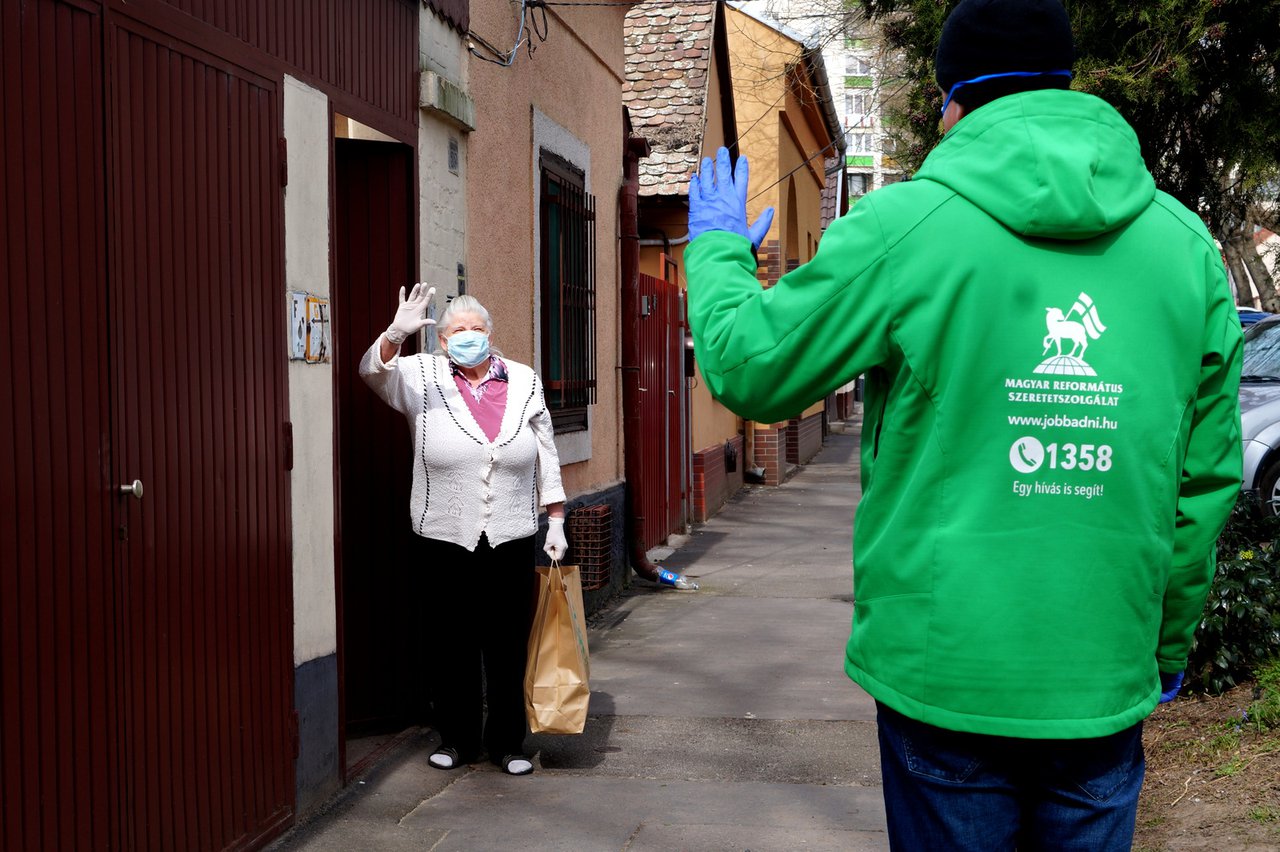
HRCA launched a fundraising campaign back in mid-March as a result of the economic recession caused by the coronavirus pandemic. Over the past few weeks they have experienced that it is not only those who live from day to day that turn to the Church Aid for help, but also those who used to be able to support their families but have no savings at all. Many have already lost their jobs, several small enterprises have gone under, and the people affected have problems covering basic living expenses.
Invisible Enemy
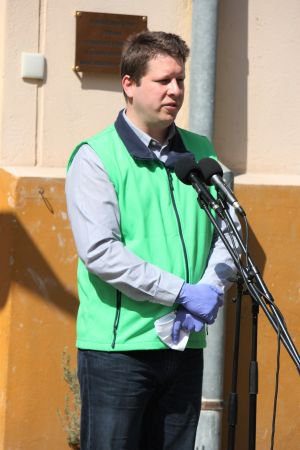
‘Several heads of state, including Hungary’s Prime Minister, have expressed the opinion that we are facing an invisible and unknown enemy. While this is certainly true, we also have some good news: our God of infinite love – who is not visible, but is knowable and his presence can be felt in the world – can prevail even in this situation. “For the Spirit God gave us does not make us timid, but gives us power, love and self-discipline”,’ quotes the Second Letter of Paul to Timothy (1:7) Márton Juhász, Managing Director of HRCA. ‘This self-discipline has moved us to start a fundraising campaign and create an emergency fund called “Together in solidarity for a new start”,’ says Mr. Juhász, whom we interviewed over the phone.
Prior to launching the emergency fund, the Church Aid reviewed its capacities and stocks, and realized that they did not have sufficient goods in storage to help everyone in need. ‘One of the reasons we started the fund was to avoid having to scramble for stocks once the pandemic is over, to avoid realizing too late that we do not have enough reserves and we cannot help others. Currently we have ten tonnes of non-perishable food, hygiene products and detergents. If we divide that amount into single units, it is enough to support a thousand individuals. In our estimation that is not going to be enough. We anticipate that people are going to turn to us not only in the current situation, in the midst of the coronavirus: once normal life resumes, there are also going to be many people asking for our support,’ says the Managing Director.
Collecting Donations in Practice
At present, HRCA is collecting donations for the ‘Together in solidarity for a new start’ emergency fund on two platforms, one of which is the website adomany.jobbadni.hu (available in Hungarian). ‘This is a community fundraising platform, where anyone who wishes to help can see the goals we have set and the amount of money we would like to raise. Visitors can also find out what percentage of each goal has already been reached and how many individuals have supported the specific goals,’ says Márton Juhász of the website. By Easter Monday, one hundred and thirty-one donors had donated one and half million HUF (over 4000 EUR) out of the set goal of five million HUF (about 14000 EUR).
The Managing Director has also revealed that those who prefer a simple bank transfer can also support their cause. The details for this type of support can be found at jobbadni.hu/en. According to Mr. Juhász, the emergency fund has received over three million HUF (nearly 8400 EUR) this way.
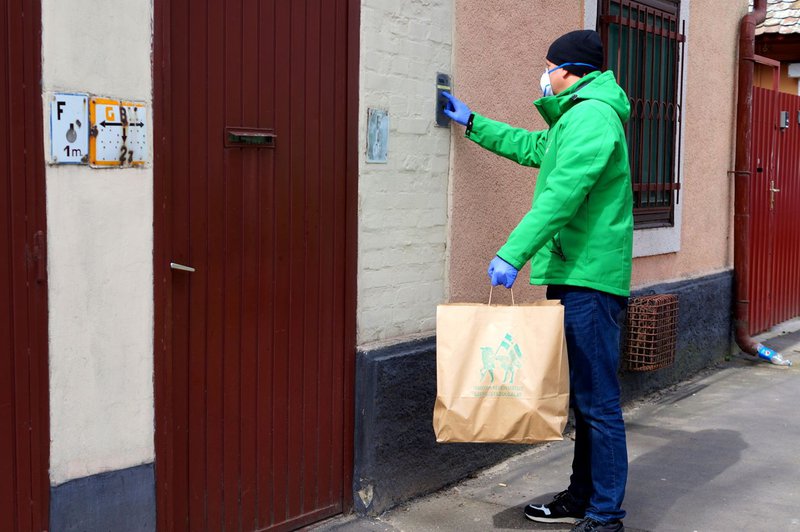
He also mentions that at this time they are not accepting in-kind donations from individuals, as such clothes or food donations could have the virus on their surface, which would potentially put the recipients, as well as HRCA’s employees and volunteers in danger. ‘Corporate donations, however, are welcome. If a company said, for example, that it could offer a thousand litres of UHT milk that requires no refrigeration, we would be more than happy to accept it, but from individuals we cannot accept in-kind donations. Furthermore, we are in great need of a warehouse in Budapest, as well as the greatest possible amount of cleaning and hygiene products and non-perishable goods,’ he adds.
Don't forget to turn on subtitles!
The emergency fund of HRCA can be supported by transferring funds to the bank account number 10702019-85008898-51100005. Donors are asked to enter ‘Összefogás az újrakezdésért' (Together in solidarity for a new start) in the comment field. Donation online is also possible at www.adomany.jobbadni.hu
Former Benefactors in Need of Help
‘The Church Aid has several offices outside the capital as well as more and more donation spots, where a hundred professionals work, therefore we are aware of a large number of individuals, families or church-run institutions that are in need of help,’ replies Márton Juhász when asked about who can benefit from the donations to the emergency fund. He adds that there are a lot of new requests for help, including from elderly people who used to be benefactors to HRCA, but now they themselves need support.
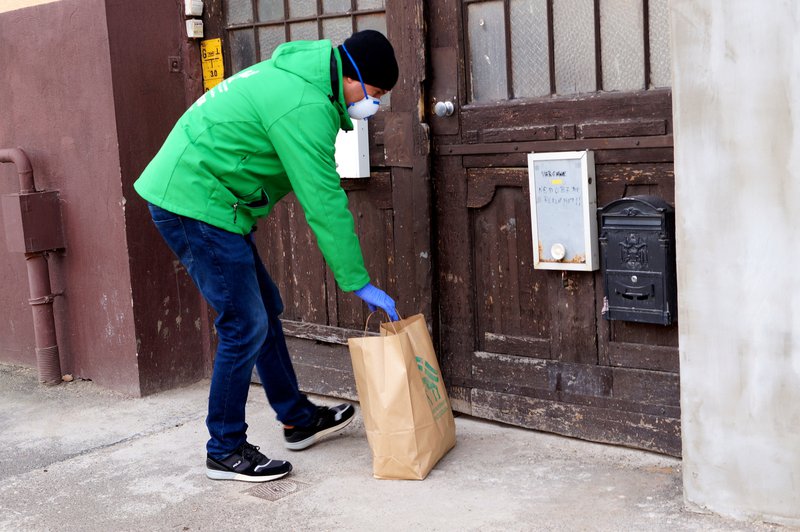
‘Additionally, we pay special attention to Roma congregations, where we offer help to our Roma brothers and sisters who are in need of support,’ the Managing Director explains. HRCA is restocking from the donations raised on an ongoing basis.
Fundraising at the National Solidarity Hotline
While the fundraising of the National Solidarity Line at the phone number 1357 is not HRCA’s own initiative, they consider it as their own. ‘Our Reformed Church Aid, together with five other charity organisations – the Hungarian Baptist Aid Foundation, the Hungarian Interchurch Aid, the Caritas Hungary, the Hungarian Charity Service of the Order of Malta and the Hungarian Red Cross –, is a member of the National Humanitarian Coordination Council (NHKT), which performs humanitarian activities during the state of emergency. It was NHKT that launched the donation line 1357, calling or texting which means a 500 HUF donation. The funds raised are going to be allocated to those in need through the six charity organisations,’ says Márton Juhász.
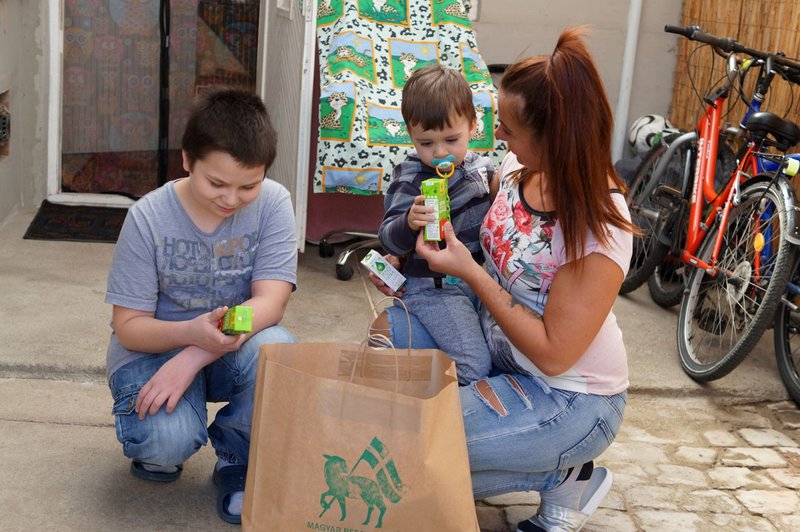
He goes on to explain that HRCA is also a member of the action team responsible for volunteering and donations, which, commissioned by the Hungarian government, launched the website segitunkegymasnak.hu, (available in Hungarian) where people can offer voluntary work, equipment or infrastructural donations or services in the fight against the coronavirus pandemic. ‘Although not through this site, but we have already been offered a three-year-old station wagon which is in great condition so that we can deliver smaller donations. We are more than happy to accept such donations as well,’ says Mr. Juhász.
Teddy Bears Replaced by Masks
Similarly to most other communities, the plans of HRCA have been transformed radically by the coronavirus epidemic. ‘To our great sadness, for the first time in twelve years, we had to postpone our annual event called Bridge of Love until an unspecified date, and several of our children’s programmes, as well as family and congregation days have had to be cancelled. Similarly, we have cancelled all HRCA events planned for the spring and early summer. We are waiting for further developments, and depending on how the situation changes, we are going to decide whether to organise make-up events, but there are bound to be events that we will only be able to organise next year,’ points out Márton Juhász.
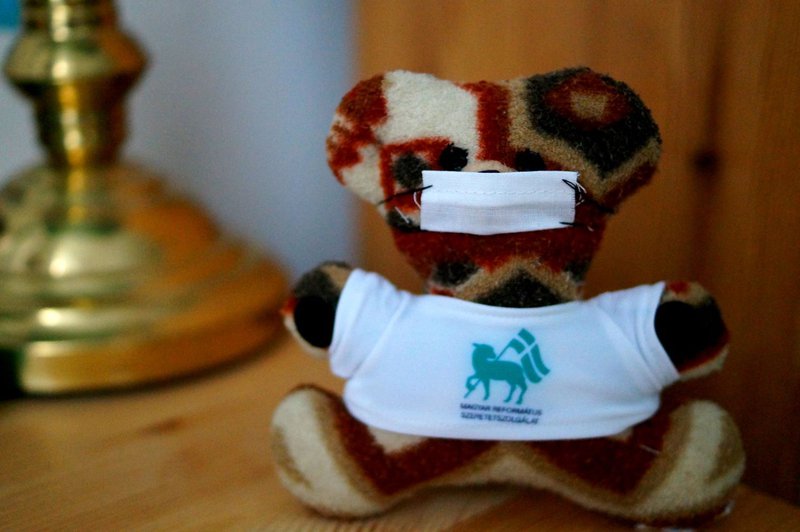
Apart from the postponement of HRCA events, the Ambulance Teddy Programme has also been affected. ‘Two years ago we undertook to sew twenty thousand teddy bears, each with a scriptural message, donating them to the National Ambulance Service (OMSZ) so that every child aged two to fourteen taken to hospital by ambulance can get one in this frightening situation,’ the Managing Director recalls. Over twelve thousand such toys have already been sewn by fifty workers, all living with disabilities, in Sarkad and Harsány. In the past few days, the task of these workers has also changed. ‘The head of the ambulance service told us that in the current situation they would need masks, rather than teddy bears. Therefore our workers are now sewing masks, and several volunteers have also joined in.’
HRCA has even published a tutorial video on Facebook (available in Hungarian), so that anyone can sew their own textile masks even without a sewing machine. Márton Juhász stresses that while such a mask does not mean complete protection against infection, it is suitable to prevent droplet transmission. The masks prepared in Sarkad and Harsány are donated to OMSZ employees, as well as to the social institutions run by the Reformed Church in Hungary.
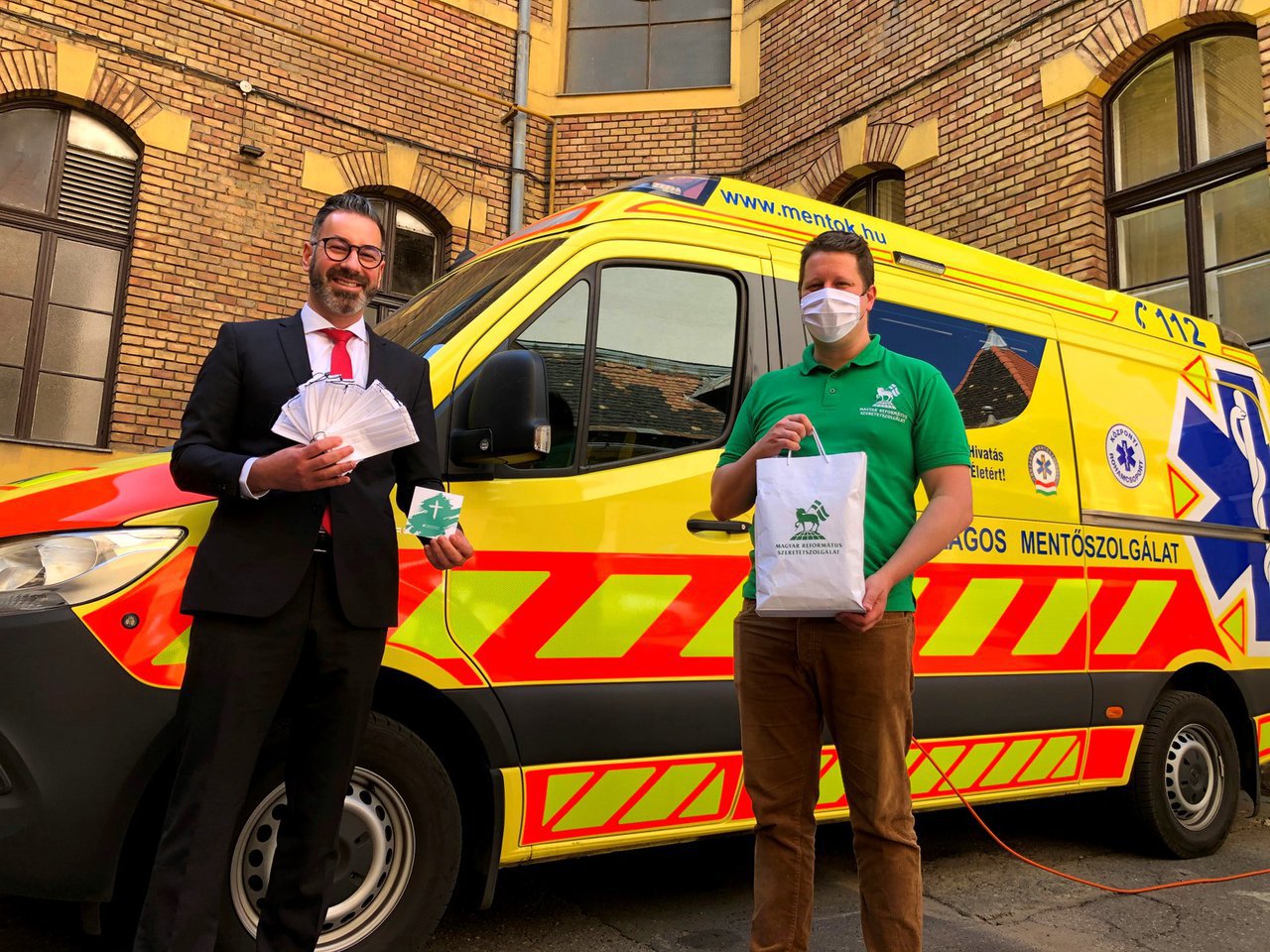
Gratitude for essential workers’ dedication
Over eight thousand everyday heroes – doctors, nurses, paramedics, firefighters, emergency management workers, police officers, social workers and shop assistants – received gifts from HRCA all over the country at Easter
Stay Home!
‘We have also joined the #stayhome movement,’ the HRCA Managing Director tells us, opining that there is a time for everything, and now there is a time to stay at home. ‘It is important that those who can work from home, as well as elderly people and university students do actually stay at home. The extra free time gained this way can be used to turn to God or to engage in some self-reflection,’ he adds, and goes on to give some further useful tips to those staying at home.
‘You can prepare your tax return and pledge 1% + 1% of your income tax: you can offer the church 1% to the Reformed Church in Hungary, and the NGO 1% to HRCA,’ suggests Márton Juhász, who explains that only forty percent of those paying income tax in Hungary donate the 1% + 1% percent that can be offered to churches and NGOs, and everyone else lets this amount go to “waste”.
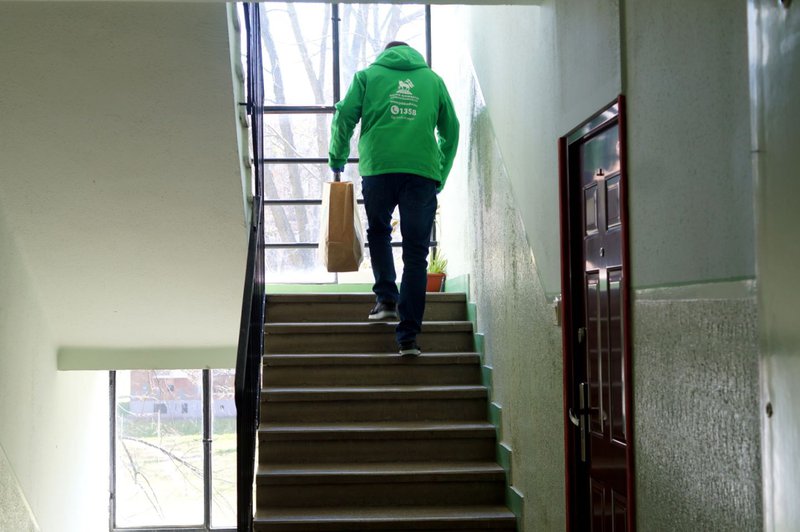
‘I find this to be a significant and good opportunity, and it would be great if all citizens used it. Those who actually pledge their NGO 1% often opt for animal rescue associations or various animal shelters. While I really love and respect animals and consider protecting the created world to be a priority, I feel that in the current crisis it is humanity that needs these donations the most. I believe that we will still find a way to take care of animals as well.’
Originally published in the Reformed Weekly of RCH
- Photos: jobbadni.hu
- Translated by Erzsébet Bölcskei